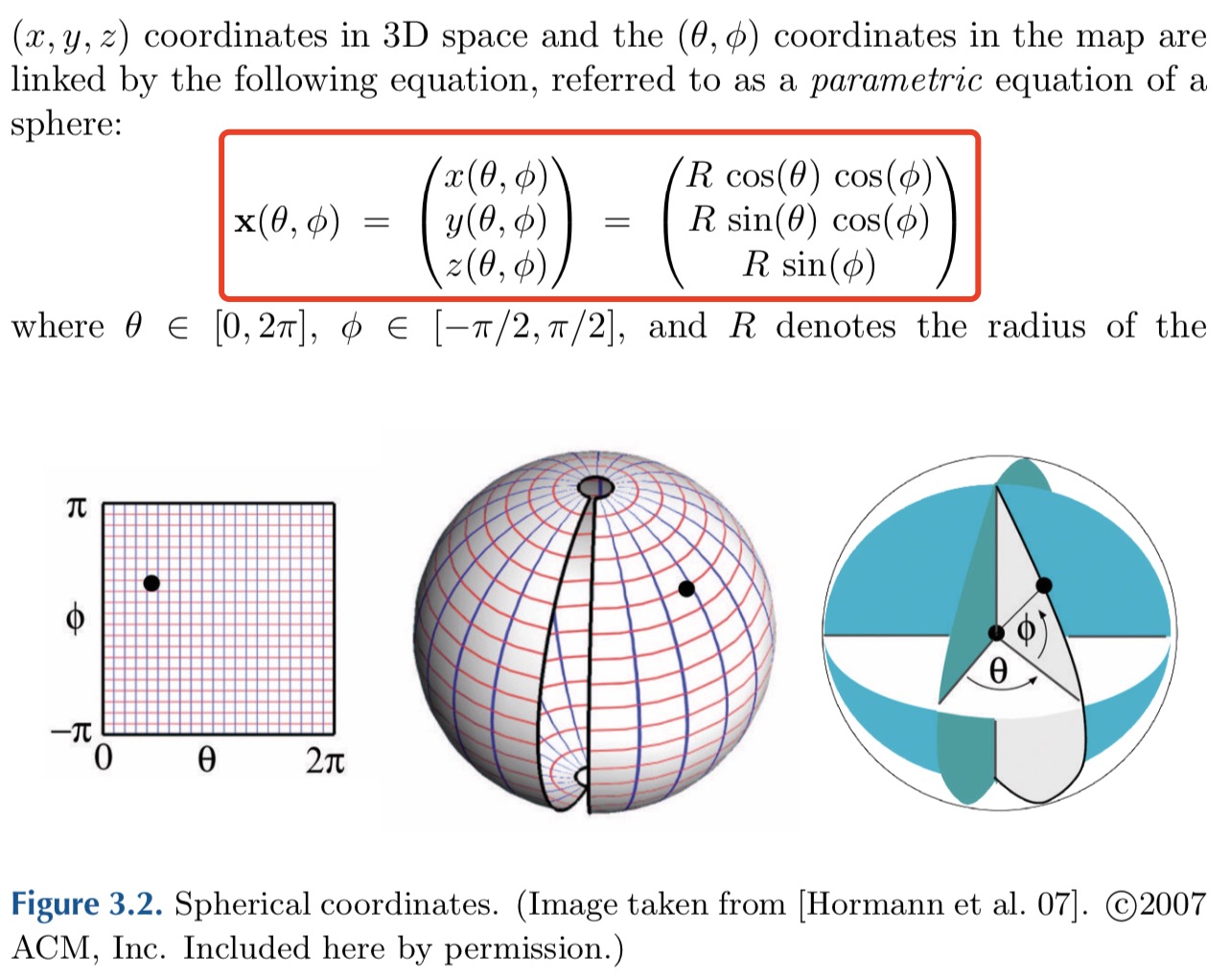An example from Polygon Mesh Processing page 32
The original equation:

I❤️LA implementation:
from trigonometry: sin, cos
`x(θ, ϕ)` = [Rcos(θ)cos(ϕ)
Rsin(θ)cos(ϕ)
Rsin(ϕ)]
where
ϕ ∈ ℝ : angle between 0 and 2π
θ ∈ ℝ : angle between -π/2 and π/2
R ∈ ℝ : the radius of the sphereI❤️LA compiled to C++/Eigen:
/*
from trigonometry: sin, cos
`x(θ, ϕ)` = [Rcos(θ)cos(ϕ)
Rsin(θ)cos(ϕ)
Rsin(ϕ)]
where
ϕ ∈ ℝ : angle between 0 and 2π
θ ∈ ℝ : angle between -π/2 and π/2
R ∈ ℝ : the radius of the sphere
*/
#include <Eigen/Core>
#include <Eigen/Dense>
#include <Eigen/Sparse>
#include <iostream>
#include <set>
struct pmp_32ResultType {
Eigen::Matrix<double, 3, 1> x_left_parenthesis_θ_comma_ϕ_right_parenthesis;
pmp_32ResultType(const Eigen::Matrix<double, 3, 1> & x_left_parenthesis_θ_comma_ϕ_right_parenthesis)
: x_left_parenthesis_θ_comma_ϕ_right_parenthesis(x_left_parenthesis_θ_comma_ϕ_right_parenthesis)
{}
};
/**
* pmp_32
*
* @param ϕ angle between 0 and 2π
* @param θ angle between -π/2 and π/2
* @param R the radius of the sphere
* @return x_left_parenthesis_θ_comma_ϕ_right_parenthesis
*/
pmp_32ResultType pmp_32(
const double & ϕ,
const double & θ,
const double & R)
{
Eigen::Matrix<double, 3, 1> x_left_parenthesis_θ_comma_ϕ_right_parenthesis_0;
x_left_parenthesis_θ_comma_ϕ_right_parenthesis_0 << R * cos(θ) * cos(ϕ),
R * sin(θ) * cos(ϕ),
R * sin(ϕ);
Eigen::Matrix<double, 3, 1> x_left_parenthesis_θ_comma_ϕ_right_parenthesis = x_left_parenthesis_θ_comma_ϕ_right_parenthesis_0;
return pmp_32ResultType(x_left_parenthesis_θ_comma_ϕ_right_parenthesis);
}
void generateRandomData(double & ϕ,
double & θ,
double & R)
{
ϕ = rand() % 10;
θ = rand() % 10;
R = rand() % 10;
}
int main(int argc, char *argv[])
{
srand((int)time(NULL));
double ϕ;
double θ;
double R;
generateRandomData(ϕ, θ, R);
pmp_32ResultType func_value = pmp_32(ϕ, θ, R);
std::cout<<"return value:\n"<<func_value.x_left_parenthesis_θ_comma_ϕ_right_parenthesis<<std::endl;
return 0;
}I❤️LA compiled to Python/NumPy/SciPy:
"""
from trigonometry: sin, cos
`x(θ, ϕ)` = [Rcos(θ)cos(ϕ)
Rsin(θ)cos(ϕ)
Rsin(ϕ)]
where
ϕ ∈ ℝ : angle between 0 and 2π
θ ∈ ℝ : angle between -π/2 and π/2
R ∈ ℝ : the radius of the sphere
"""
import numpy as np
import scipy
import scipy.linalg
from scipy import sparse
from scipy.integrate import quad
from scipy.optimize import minimize
class pmp_32ResultType:
def __init__( self, x_left_parenthesis_θ_comma_ϕ_right_parenthesis):
self.x_left_parenthesis_θ_comma_ϕ_right_parenthesis = x_left_parenthesis_θ_comma_ϕ_right_parenthesis
def pmp_32(ϕ, θ, R):
"""
:param :ϕ : angle between 0 and 2π
:param :θ : angle between -π/2 and π/2
:param :R : the radius of the sphere
"""
assert np.ndim(ϕ) == 0
assert np.ndim(θ) == 0
assert np.ndim(R) == 0
x_left_parenthesis_θ_comma_ϕ_right_parenthesis_0 = np.zeros((3, 1))
x_left_parenthesis_θ_comma_ϕ_right_parenthesis_0[0] = [R * np.cos(θ) * np.cos(ϕ)]
x_left_parenthesis_θ_comma_ϕ_right_parenthesis_0[1] = [R * np.sin(θ) * np.cos(ϕ)]
x_left_parenthesis_θ_comma_ϕ_right_parenthesis_0[2] = [R * np.sin(ϕ)]
x_left_parenthesis_θ_comma_ϕ_right_parenthesis = x_left_parenthesis_θ_comma_ϕ_right_parenthesis_0
return pmp_32ResultType(x_left_parenthesis_θ_comma_ϕ_right_parenthesis)
def generateRandomData():
ϕ = np.random.randn()
θ = np.random.randn()
R = np.random.randn()
return ϕ, θ, R
if __name__ == '__main__':
ϕ, θ, R = generateRandomData()
print("ϕ:", ϕ)
print("θ:", θ)
print("R:", R)
func_value = pmp_32(ϕ, θ, R)
print("return value: ", func_value.x_left_parenthesis_θ_comma_ϕ_right_parenthesis)I❤️LA compiled to MATLAB:
function output = pmp_32(phi, theta, R)
% output = pmp_32(ϕ, θ, R)
%
% from trigonometry: sin, cos
% `x(θ, ϕ)` = [Rcos(θ)cos(ϕ)
% Rsin(θ)cos(ϕ)
% Rsin(ϕ)]
%
% where
%
% ϕ ∈ ℝ : angle between 0 and 2π
% θ ∈ ℝ : angle between -π/2 and π/2
% R ∈ ℝ : the radius of the sphere
if nargin==0
warning('generating random input data');
[phi, theta, R] = generateRandomData();
end
function [phi, theta, R] = generateRandomData()
phi = randn();
theta = randn();
R = randn();
end
assert(numel(phi) == 1);
assert(numel(theta) == 1);
assert(numel(R) == 1);
x_theta_phi_0 = zeros(3, 1);
x_theta_phi_0(1,:) = [R * cos(theta) * cos(phi)];
x_theta_phi_0(2,:) = [R * sin(theta) * cos(phi)];
x_theta_phi_0(3,:) = [R * sin(phi)];
x_theta_phi = x_theta_phi_0;
output.x_theta_phi = x_theta_phi;
end
I❤️LA compiled to LaTeX:
\documentclass[12pt]{article}
\usepackage{mathdots}
\usepackage[bb=boondox]{mathalfa}
\usepackage{mathtools}
\usepackage{amssymb}
\usepackage{libertine}
\DeclareMathOperator*{\argmax}{arg\,max}
\DeclareMathOperator*{\argmin}{arg\,min}
\usepackage[paperheight=8in,paperwidth=4in,margin=.3in,heightrounded]{geometry}
\let\originalleft\left
\let\originalright\right
\renewcommand{\left}{\mathopen{}\mathclose\bgroup\originalleft}
\renewcommand{\right}{\aftergroup\egroup\originalright}
\begin{document}
\begin{center}
\resizebox{\textwidth}{!}
{
\begin{minipage}[c]{\textwidth}
\begin{align*}
\text{from trigonometry import sin, cos}\\
\textit{x(θ, ϕ)} & = \begin{bmatrix}
\mathit{R}cos\left( \mathit{θ} \right)cos\left( \mathit{ϕ} \right)\\
\mathit{R}sin\left( \mathit{θ} \right)cos\left( \mathit{ϕ} \right)\\
\mathit{R}sin\left( \mathit{ϕ} \right)\\
\end{bmatrix} \\
\intertext{where}
\mathit{ϕ} & \in \mathbb{R} \text{ angle between 0 and 2π} \\
\mathit{θ} & \in \mathbb{R} \text{ angle between -π/2 and π/2} \\
\mathit{R} & \in \mathbb{R} \text{ the radius of the sphere} \\
\\
\end{align*}
\end{minipage}
}
\end{center}
\end{document}
I❤️LA LaTeX output: